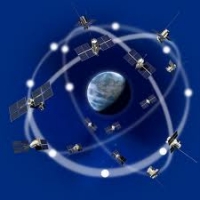GLONASS is a radio-based satellite navigation system operated for the Russian government by the Russian Space Forces. It both complements and provides an alternative to the United States' Global Positioning System (GPS), the Chinese Compass navigation system and the planned Galileo positioning system of the European Union.
Development of GLONASS began in the Soviet Union in 1976. Beginning on 12 October 1982, numerous rocket launches added satellites to the system until the "constellation" was completed in 1995. In the first decade of the 21st century, under Vladimir Putin's presidency, the restoration of the system was made a top government priority and funding was substantially increased. GLONASS is currently the most expensive program of the Russian Federal Space Agency, consuming a third of its budget in 2010.
By 2010, GLONASS had achieved 100% coverage of Russia's territory and in October 2011, the full orbital constellation of 24 satellites was restored, enabling full global coverage. The GLONASS satellites designs have undergone several upgrades, with the latest version being GLONASS-K.








































